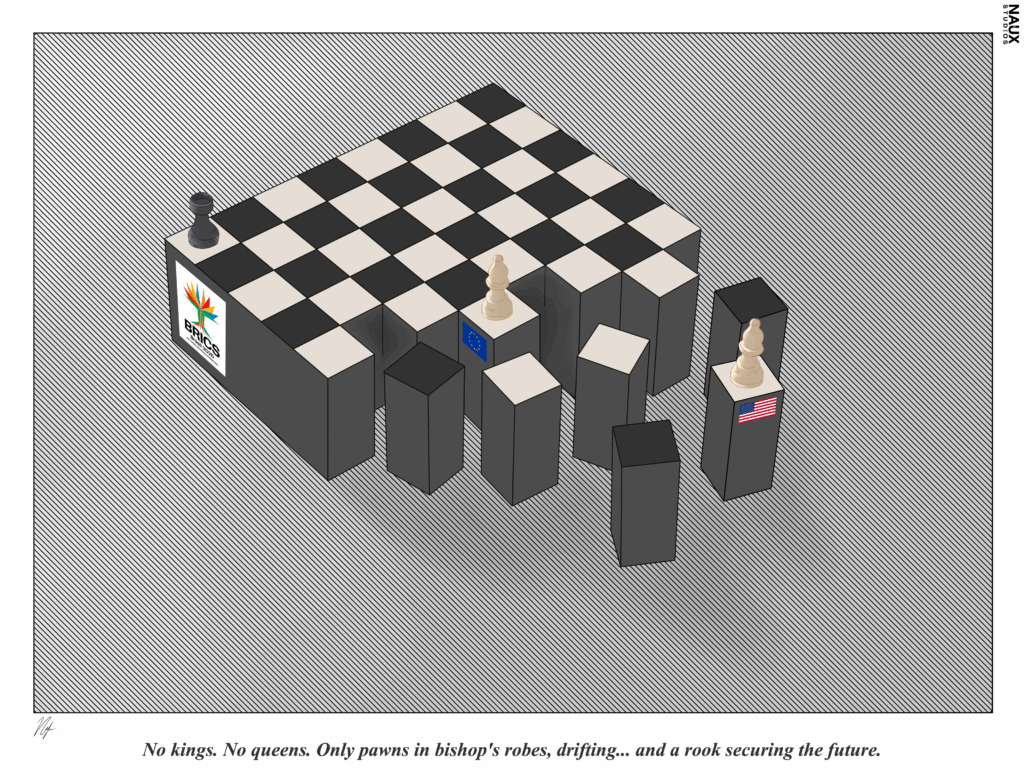Dark Money in the DNC Isn’t a Scandal — It’s a Systemic Risk to Investors
The scandal isn’t that dark money exists. The scandal is that WIRED was allowed to publish it, and the geopolitical stratagems that follow.

Most people are debating the wrong thing about Taylor Lorenz’s recent WIRED article on Democratic dark money.
They’re fixated on the content — whether the reporting was accurate, whether Democrats are “as bad” as Republicans, whether this makes the DNC look hypocritical. That’s a red herring.
The real question isn’t what the article says. The real question is:
-
Would WIRED have allowed this piece to be published just six months ago?
-
And what does its existence now tell us about where U.S. institutions stand?

A blaring indicator of the DNC’s eroding grip on narrative control.
Because let’s be honest: a corporate-backed outlet like WIRED would have killed this story immediately in Spring 2025. Until very recently, exposing Democratic dark money — without a “both sides” cushion — was unthinkable. The fact that it passed editorial review in Fall 2025 signals something far more grave than a political scandal. That kind of shift normally unfolds over years. It is happening in months.
[I] Cracks in the Political Dam
The publication of the WIRED article is not an isolated event, but rather a canary in the coal mine signaling one crucial reality:
The dam of elite consensus is breaking. The gatekeepers are losing control. The narrative is escaping. The Overton window isn't just shifting; it's shattering.
The West’s centuries-long monopoly on story-based control is fracturing in real time. Investors, policymakers, and global competitors are watching U.S. institutions lose control of their own story.
International entities, China and Russia included, don’t care about surface-level squabbles. They already assumed both parties were corrupt. What they’re paying attention to is the permission slip this article represents. And trust me: they are already making plans to capitalize on the strategic implications of these cracks.
The discourse surrounding Lorenz and her critics — e.g., Elizabeth Booker Houston, JD, MPH (@bookersquared), A.B. Burns-Tucker, Esq. (@iamlegallyhype), Kenneth Walden — shouldn’t register as a simple domestic partisan issue. It is a symptom of the rapid systemic disintegration I’ve been consistently illustrating since June. The fact that this is happening now, at an unprecedented rate of change, proves my model correct. The cascade of Western collapse is accelerating, and it’s rapidly translating into lost ground in market confidence.
[II] A Geopolitical Lens
[A] Normalizing Corruption Through “Both Sides” Rhetoric Erodes Trust & Increases Volatility
The argument that “both parties do it” is not a moral justification — it is a psychological tool to induce apathy and acceptance of systemic corruption. The revelation that Democratic-aligned groups like the Sixteen Thirty Fund are secretly paying influencers up to $8,000 monthly to push party messaging — while forbidding them from disclosing funding — is not a mere mirror of Republican tactics. It is evidence of a shared commitment to oligarchic control masked by partisan theater. As the Wired article notes, creators were required to funnel all engagements with politicians through Chorus, effectively making the organization a gatekeeper between Democratic leaders and their base. This is not democracy; it is lobbying disguised as activism.
[B] The DNC’s “Center-Right” Approach is a Poor Bet for Stability

Circles sized by the % of the vote won by the party in the latest election in this data [Source: NY Times, 2019]
To call the DNC “left” is a categorically bankrupt framing. In a global context, the Democratic Party aligns with center-right to right-wing ideologies:
-
Economic Policy // The DNC tolerates dark money and corporate influence in primaries, systematically blocking progressives advocating for Medicare for All, Gaza ceasefires, and climate action.
-
Foreign Policy // Trump’s move to cancel $4.9 billion in foreign aid via a legally dubious “pocket rescission” was criticized by Democrats like Susan Collins and Chuck Schumer. Yet, the DNC has never fundamentally challenged the imperial logic of such actions — only their execution. Their opposition is procedural, not ideological.
-
Social Policy // Democrats perform progressivism on issues like LGBTQ+ rights, but their reliance on dark money (crypto, fossil fuels, AIPAC) structurally limits reform. This preference for incrementalism over systemic solutions isn’t just institutional impotence — it’s a governance failure that amplifies long-term policy risk for capital.

Blair illustrates how American centrism in its present form (between the current Democratic & Republican parties) equates to conservatism.
As Gabrielle Blair aptly explains in her article “The Lopsided U.S. Political Spectrum”:
When I say Democrats are at the center, it’s true. An example of Center-Left Democrats would be AOC and Bernie. And example of Center-Right Democrats would be the Harris-Walz tickets, which is a pro-military ticket. At the moment, America really doesn’t have any functioning/influential political parties truly left of center.
In contrast, actual liberal movements, such as those in Latin America or Europe, advocate for wealth redistribution, demilitarization, and decolonization. The DNC strictly opposes these.
[C] Bipartisan Dark Money Signals Institutional Failure
The Chorus scandal is not an anomaly; it is a feature meant to manage and preserve imperial power. Consider:
-
The Sixteen Thirty Fund — an organization that lauds itself for empowering “progressive change makers” while also funding Chorus — funneled $400 million into left-leaning causes in 2020 alone. Yet, this “dark money” machine primarily sustains centrist Democrats who uphold the status quo. More importantly, the collapse of U.S. editorial control could trigger 10x more in lost market trust.
-
Republicans have long relied on networks like the Koch brothers to fund their agenda. The DNC’s adoption of similar tactics reveals a convergence:
Both parties serve capital, not people. The question is whether capital itself can survive the collapse of narrative control. Current signs point to no.
This is not “politics as usual.” It is a class war from above, waged by donors who profit from imperialism and inequality.
[D] Faux Progressivism Diverts Energy from Real Reform
By masquerading as progressive, the DNC neutralizes dissent. Examples:
-
Project 2025 // Democrats loudly oppose this GOP plan to gut the federal government. Yet, they offer no structural alternative. Only fear-based messaging to rally voters behind their own corporatist candidates.
-
Redistricting Fights // In Texas, Democrats fled the state to block GOP gerrymandering. But in blue states like California, they simultaneously gerrymander to gain seats. This is not principle; it is partisan opportunism.
The DNC’s “resistance” is designed to fail; keeping activists trapped in a cycle of outrage and electoralism that changes nothing.
[E] The Only Safe Investment is in Systems Outside the Blast Zone of Decay
Apathy is not the answer. Strategic divergence is. Rather than justifying DNC corruption because “Republicans do it,” we must:
-
Support independent media and grassroots movements that reject dark money.
-
Recognize that the U.S. political spectrum has formidable liberal coalition, and stop legitimizing the DNC as “left” and/or “progressive.”
-
Build international solidarity with movements in the Global South that challenge U.S. imperialism.
As the Chorus misconduct shows, both parties are beyond reform. The goal is not to fix them — it is to build a world outside their control.
[III] The Mask is Off
The DNC’s use of dark money is not a “lesser evil.” It is proof that the entire U.S. political system is rigged to serve empire and capital. The “both sides” narrative is a lie designed to make American citizens complicit in their own oppression. True change requires not voting for the “lesser evil,” but dismantling the system that creates evil choices.
The well has not been poisoned.
There was never any water in it.
It has always been poison.
[IV] A Game of International Chess
To put my perspective in simpler terms: too many high-profile actors are focused on the chessboard — the superficial critiques analyzing which side uses dark money more, or whether Taylor Lorenz’s reporting was “fair.”
But strategists, and policymakers, and investors cannot afford that distraction. The real risk isn’t which piece is moving where. The real risk?
Both parties serve capital, not people. The question is whether capital itself can survive the collapse of narrative control. Current signs point to no.
Before this summer’s geopolitical fiascos, WIRED would never have green-lit the production of this story. The fact that it exists now signals the demise of editorial gatekeeping and an unraveling in the Western narrative monopoly.
For capital allocators, that means:
-
Volatility Risk // Legacy institutions are losing control of their story faster than they can adapt. Expect sudden swings in market sentiment tied to political credibility.
-
Governance Risk // Both major U.S. parties are revealed as equally dependent on oligarchic financing. That destroys the stability premium investors once attached to American politics.
-
Strategic Risk // Multipolar competitors (Norway, China, Russia, BRICS International Forum) are watching the same signals and already positioning to capitalize on this narrative rupture.
The lesson is simple: don’t get caught staring at the pawns. The shallow scandals don’t matter. What matters is that the rules of chess are no longer stable, and any system whose rules metastasize this quickly — spreading unpredictably and uncontrollably — is an unsound investment. A tactically sound position entails: demanding transparency, supporting media integrity, and diversifying investments toward multipolar or alternative frameworks.
In other words: the ROI on “faux politics” is collapsing. The smart money will start looking elsewhere.

